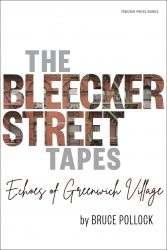 Essentially a compendium of articles, interviews with, and profiles of artists pertaining to the folk boom of the early 60s in Greenwich Village and its influence on the following decades, ‘The Bleeker Street Tapes’ roams much wider than one might expect from its title. The author was a resident of the village back in the days and has since carved a career in music journalism. Here he follows a curve from the early coffee house days to, in some cases, rock stardom, and for some, spectacular falls from grace.
Essentially a compendium of articles, interviews with, and profiles of artists pertaining to the folk boom of the early 60s in Greenwich Village and its influence on the following decades, ‘The Bleeker Street Tapes’ roams much wider than one might expect from its title. The author was a resident of the village back in the days and has since carved a career in music journalism. Here he follows a curve from the early coffee house days to, in some cases, rock stardom, and for some, spectacular falls from grace.
An introductory chapter, “The Troubadours of the Folk Era” (written in 1992), is a handy primer as to how various threads coalesced into what became “The Great American Folk Scare” of the early sixties – Seeger and Guthrie the godfathers. Pollock celebrates the scene but his litany of the dead (Mama Cass, Tim Hardin, Tim Buckley and Phil Ochs) is the dark underbelly of what came after. He then goes on to offer a selection of interviews (ranging from the early 70s to the early 90s) with various artists who either were embedded in the village scene or who grew out of it. Several of these are mere vignettes, Janis Ian, The Roches and Loudon Wainwright are dispatched in a few pages, time capsules maybe but essentially PR pieces.
Much more revelatory are the lengthier interviews. Phil Ochs in 1974 ponders on his political songs and his lack of chart success. Peter Tork, reduced from Monkees’ stardom to penury in 1981, recalls the high tide of psychedelia and student radicalism although his somewhat convoluted thoughts might be seen to be evidence that he perhaps partook of too many mind-bending stimulants. The chapters on John Sebastian and Roger McGuinn (both from 1982) are more straightforward with both of them somewhat in the doldrums after their best-selling days are long gone. And that’s perhaps the crux of the book, the high tide long receded. The idealism and optimism of Greenwich Village and the bohemian lower east side didn’t last, some of the artists were seduced by moneyed contracts, others succumbed to drugs and alcohol. It’s telling that in the best of the interviews here, Dave Van Ronk, the Mayor of MacDougal Street and a major figure in the Greenwich Village scene is captured while preparing for a gig in a seedy Connecticut theatre which hasn’t sold many tickets. He’s stoic, recalling the heady optimism of the early 60s and saying that after Dylan there was still great talent around the village but that “there was more hokey shit around too, money always attracts talented people; money also attracts greed.”
Dylan himself only gets a mention late in the book when Pollock, by now an accredited journalist, can’t get a ticket to see him and The Band on his infamous 1974 Before The Flood comeback tour. In the most entertaining chapter here, Pollock hauls in a favour from an old friend who happens to run the beer concession for Madison Square Garden and ends up watching the show with a backpack of cold beer strapped to his shoulders, ignoring his thirsty punters and being later admonished for his lack of sales.
The Bleeker Street Tapes isn’t an essential read by any stretch but for fans of the period it’s well worth a punt. Aside from the artists already mentioned Pollock also gets to sit down with Leonard Cohen, Suzanne Vega, Maria Muldaur, Richie Havens, Harry Chapin, Melanie, Buffy Sainte-Marie, Don McLean, Peter, Paul & Mary, Tuli Kupferberg and Eric Andersen. A fine line up.


